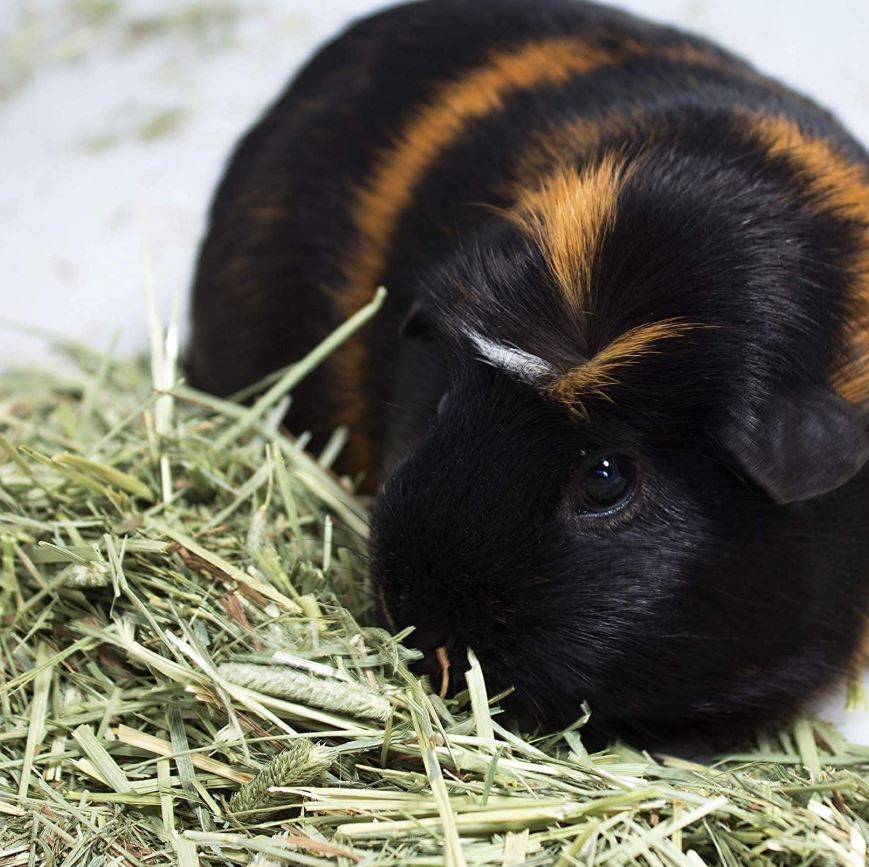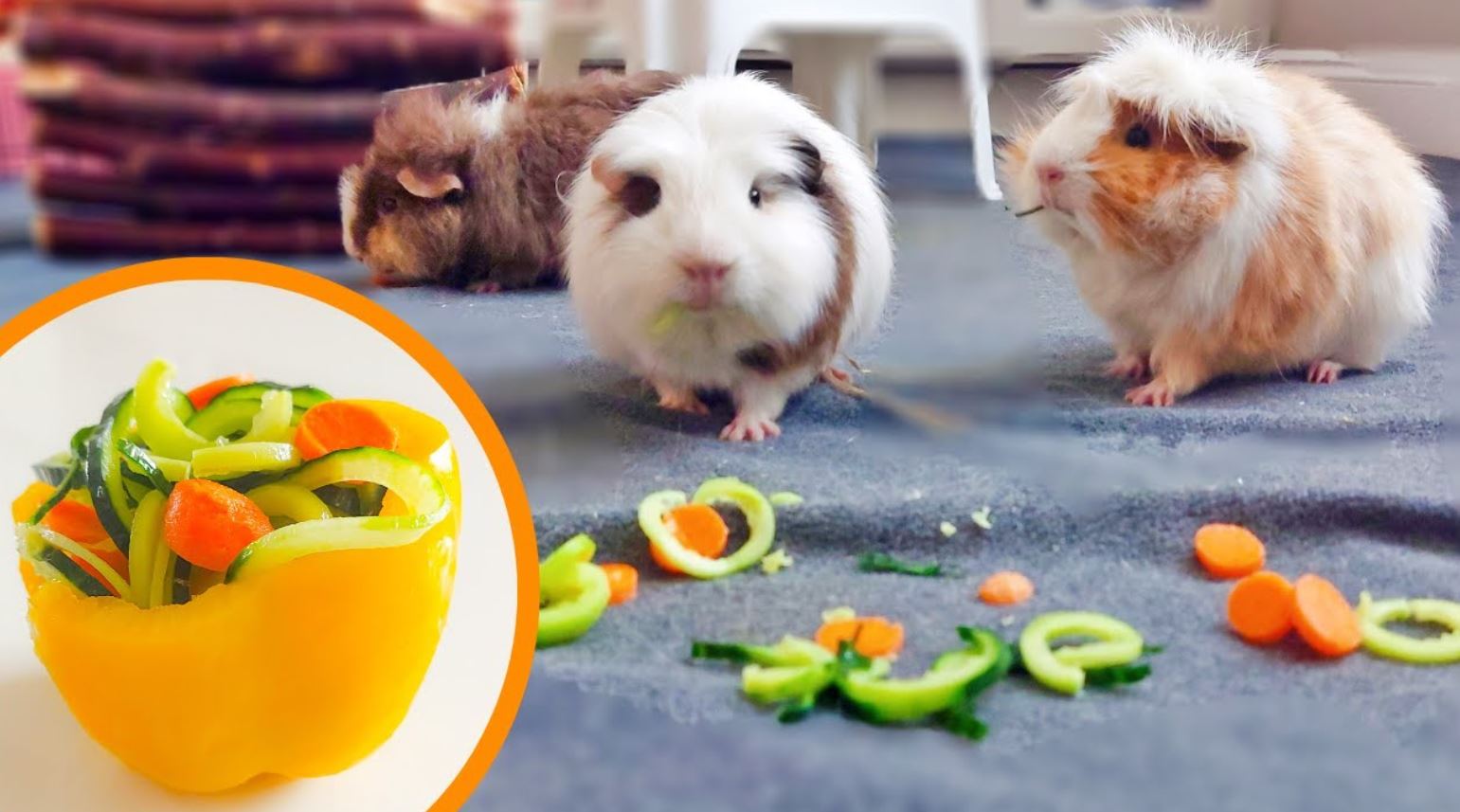Most of our local pet stores have flashy guinea pig food mixes filled with colorful seeds, nuts, dried fruit, and artificial dyes. This however correlates exactly the type of nutrition-related problems that cause the majority of diseases seen in guinea pig patients. These attractive pellet mixes encourage selective feeding where they pick out the sugary treats while leaving behind essential nutrition. Meanwhile, vitamin C in commercial pellets degrades rapidly. They lose potency within 90 days of production, yet many pet stores stock products that have been sitting on shelves for months.
What’s worse is that even small changes like switching pellet brands can cause guinea pigs to refuse eating entirely. It’s a life-threatening emergency since guinea pigs losing 100g in 24 hours need immediate veterinary care. Inadequate vitamin C leads to scurvy within just 2-3 weeks, causing poor wound healing, dental disease, joint swelling, and increased susceptibility to infections. From our observation, local guinea pig owners frequently struggle to find experienced exotic veterinarians, often facing dismissive attitudes where guinea pigs are treated as “just small animals” rather than complex pets requiring specialized care. The result? Preventable suffering that could devastate your beloved guinea pig’s health and potentially cost hundreds in emergency veterinary bills.
Here’s your solution: this comprehensive guinea pig food guide will save you from these costly mistakes by teaching you exactly what to feed your guinea pig for optimal health and longevity. You’ll discover which local Malaysian sources offer quality timothy hay, how to identify truly nutritious pellets versus marketing gimmicks, and simple vitamin C-rich vegetables available in any Malaysian supermarket. Most importantly, you’ll gain the confidence to provide proper nutrition that prevents expensive health crises while ensuring your guinea pig lives a happy, healthy life for years to come.
“Guinea pigs have a daily requirement for vitamin C, as it cannot synthesize this vitamin itself, and sub-clinical vitamin C deficiency is a common predisposing factor for most other diseases.” – The Veterinary Nurse Journal (Source)

Timothy hay should make up 75-85% of your guinea pig’s daily diet and must be available 24 hours a day. Think of hay like rice for us, a staple food that keeps everything running smoothly! Your guinea pig’s digestive system is specifically designed for constant grazing, just like their wild cousins in the Andes mountains.
Guinea pigs’ teeth grow continuously throughout their lives, and the fibrous texture of timothy hay naturally wears down their teeth to prevent dangerous overgrowth. Without enough hay, your guinea pig can develop painful malocclusion (misaligned teeth) that makes eating difficult or impossible. Poor hay intake leads to dental problems like gum inflammation and loose teeth, often requiring expensive veterinary intervention.
While timothy hay can be found in some local pet stores and equestrian centers, quality varies significantly. Look for hay that’s green, sweet-smelling, and free from dust or mold. Adult guinea pigs over 6 months should eat timothy hay exclusively, while younger guinea pigs can have alfalfa hay for extra calcium.
Our country’s humidity can quickly spoil hay, so store it in airtight containers in cool, dry areas. Replace any hay that smells musty or looks brown. Your guinea pig’s health isn’t worth the risk!
Unlike most animals, guinea pigs cannot produce their own vitamin C and require 10-30mg daily depending on age, pregnancy, or illness. This makes them similar to humans in their vitamin C dependency. It’s pretty unique in the animal kingdom!
Offer one cup of fresh vegetables per guinea pig daily, focusing on dark leafy greens high in vitamin C. Safe options include romaine lettuce, cilantro, bell peppers, and carrot tops. However, be cautious with calcium-rich vegetables like kale and spinach if your guinea pig has a history of bladder stones.
Finding consistent supplies of guinea pig-safe vegetables in Malaysia requires creativity. If you have a chance, visit markets to get fresh greens. Don’t be afraid to grow your own herbs like cilantro and parsley. FYI, they thrive in our tropical climate!
Guinea pigs develop dietary preferences early and resist changes, so introduce new vegetables gradually. One type at a time over several days. This prevents digestive upset and helps you identify any foods that don’t agree with your pet.

Adult guinea pigs need 1/8 cup (approximately 1-2 tablespoons) of high-quality pellets daily per guinea pig. That’s not much. It’s about the size of a small handful! Many exotic pet owners overfeed pellets, leading to obesity and selective eating habits.
Guinea pig food to prevent obesity focuses on unlimited hay, measured pellets, and avoiding high-sugar treats commonly sold in pet stores. Obesity in guinea pigs leads to serious health problems and makes it difficult for them to regulate body temperature in Malaysia’s hot climate.
Choose plain timothy-based pellets without seeds, dried fruits, or colorful bits that encourage selective eating. Pellets lose their vitamin C content within 90 days of manufacture, so check expiration dates carefully and buy from stores with high turnover.
Our tropical climate means guinea pigs may drink more water and eat slightly less during the hottest parts of the day. Monitor their eating patterns and adjust accordingly, always ensuring fresh water is available.
While commercial diets are convenient, you can supplement with safe, homemade treats that provide variety and enrichment for your guinea pig.
Create a daily “salad” using 2-3 types of safe vegetables. A typical mix might include: a handful of romaine lettuce, a few cilantro sprigs, and half a small bell pepper. Always wash vegetables thoroughly and avoid anything from the onion family, citrus fruits, or chocolate.
Growing your own guinea pig herbs in Malaysia is economical and ensures freshness. Cilantro, parsley, and basil all grow well in our climate and provide natural variety to your guinea pig’s diet.
If your guinea pig stops eating for 12-24 hours, it’s a veterinary emergency requiring immediate attention. Keep critical care pellets or create an emergency slurry using pellets soaked in water for syringe feeding under veterinary guidance.
Certain foods are toxic or dangerous for guinea pigs, including chocolate, onions, garlic, avocado, and dairy products. Malaysian pet owners should be especially careful about local foods that might seem harmless but could harm their guinea pigs.
Avoid feeding your guinea pig local fruits high in sugar like rambutan or durian, and never share spicy Malaysian dishes or foods cooked with onions or garlic. Stick to the 85% hay, 10% vegetables, 5% pellets rule for optimal health.
“The single most important principle of nutrition is that the guinea pig has a daily requirement for vitamin C, as it cannot synthesize this vitamin itself, and sub-clinical vitamin C deficiency is a common predisposing factor for most other diseases.” – The Veterinary Nurse (Source)
Proper guinea pig food isn’t complicated once you understand the basics. Here’s the checklist: unlimited timothy hay, measured pellets, fresh vegetables, and clean water. By focusing on these essential elements and avoiding common feeding mistakes, you’re giving your guinea pig the best chance at a long healthy life.
The key to successful guinea pig nutrition lies in consistency, quality ingredients, and understanding their specific needs as herbivorous pets. Whether you’re choosing vitamin C rich guinea pig food options from local stores or preparing homemade guinea pig food recipes at home, always prioritize their natural dietary requirements over convenience.
Don’t let your guinea pig become another victim of preventable nutritional diseases. At Exotic and Small Animals Medical Centre, our specialized veterinarians understand the unique challenges of guinea pig care in Malaysia and can provide personalized dietary guidance for your beloved pet. Contact us today for a comprehensive nutritional consultation and ensure your guinea pig gets the expert care they deserve – because proper nutrition is the foundation of a happy, healthy guinea pig life!